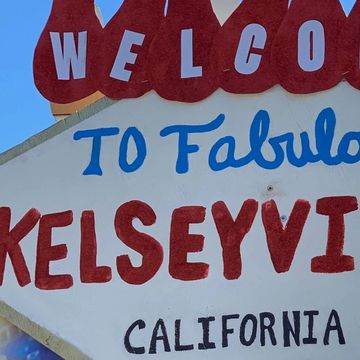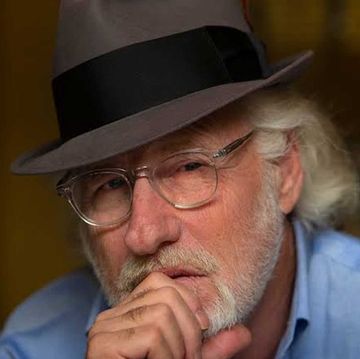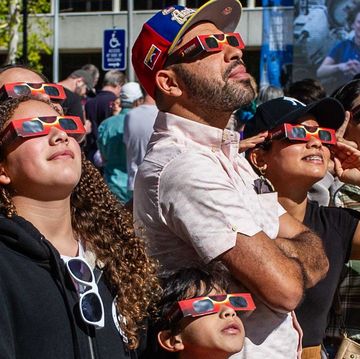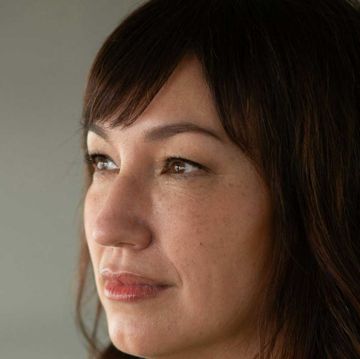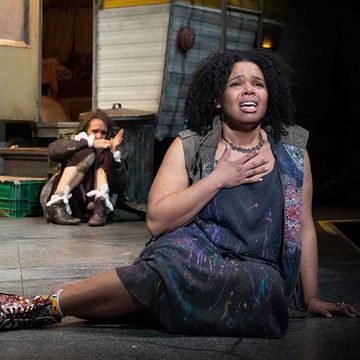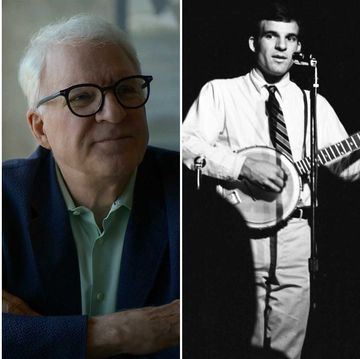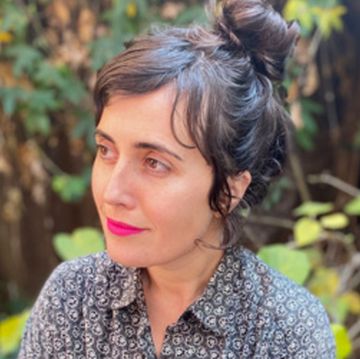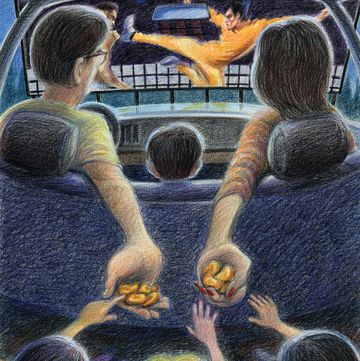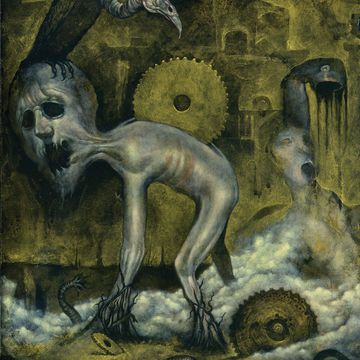Camera flashes bounced off the already gleaming silver sails of Walt Disney Concert Hall. It was a hot and windy Saturday night in late October 2003—the San Bernardino Mountains were on fire just up north—when the likes of Sidney Poitier, Catherine Zeta-Jones, and Annette Bening emerged from their hired cars and waltzed through a battery of photographers and into this brand-new cathedral as if it were a movie premiere. In a way, it was.
Inside the hall, the Los Angeles Philharmonic music director Esa-Pekka Salonen co-conducted a night of music from the movies with the legendary film composer John Williams. The concert began with the premiere of a new piece, Soundings, that Williams had written especially for Disney Hall’s opening, followed by classic film-score selections by composers Bernard Herrmann, Jerry Goldsmith, Alfred Newman, and Williams. Introducing the evening was a dark-suited Steven Spielberg, Williams’s most important collaborator. The movie director noted that Walt Disney had revered classical music and would have loved this hall, “a magical, musical kingdom for both the people of Los Angeles and the entire world.”
Sure, the previous two nights of celebrations had featured sanctified fare from the LA Phil’s repertoire—Stravinsky, Mozart—and a premiere by modern classical darling John Adams. But Deborah Borda, the LA Phil’s new chief executive at the time, intentionally dedicated one of the hall’s three opening galas to movie music “because it’s such an important part of the DNA of L.A.,” she told me later.
Right from its opening 20 years ago and down to its name—Walt Disney—the Downtown home of the LA Phil has been Hollywood’s concert hall. That has irked some critics and traditionalists, but it has also healed some old, pointless divisions and rightly celebrated the wealth of great symphonic music that has been produced in this city for the past century. The modern marriage between Hollywood and L.A.’s classical ecosystem is embodied by the love affair between Williams and conductor Gustavo Dudamel, who took over for Salonen and has led the LA Phil during most of its two-decade residency at Disney Hall. It’s a mutual admiration society, and Dudamel always insists that Williams belongs among the greatest composers of all time—not merely film composers but the Beethovens and Mozarts and Bachs on the Mount Olympus of music.
This article appears in Issue 25 of Alta Journal.
SUBSCRIBE
The romance is welcome, but it was long overdue. For the first seven decades of movie scoring, a great wall existed between Hollywood and the concert hall at large. The music and its composers weren’t accepted by symphony orchestras and their administrations. It was a prejudice that conductor John Mauceri contends, in his recent book The War on Music: Reclaiming the Twentieth Century, had more than a whiff of anti-Semitism about it, as most of the first generation of film composers were Jews who had fled Europe to escape the Nazis. But this cold war was also about melody versus atonal modernism and about commerce versus “high” art. The LA Phil held the party line in that fight, even though many of its musicians played on film and TV scores by day and the orchestra would perform movie music in pops concerts at its summer home, the Hollywood Bowl.
The classist old attitude about movie music was summed up by the Los Angeles Times’ veteran music critic (and reliable grouch) Martin Bernheimer in a 1983 review of an LA Phil concert that Williams conducted at the Music Center’s Dorothy Chandler Pavilion, the orchestra’s home before Disney Hall. Why “entrust a presumably serious winter-season program” to John Williams, Bernheimer asked. “Why would anyone think that what is good for the Hollywood Bowl goose is good for the Music Center gander?” Even in L.A.—in Hollywood—that was the prevailing doctrine, and it was religiously maintained.
“You would play Star Wars at the Bowl,” says Williams, who turned 91 this year, “but you wouldn’t necessarily put that on a subscription concert. I think the divide is there, and it’s for historic reasons—of music coming from other media that doesn’t seem appropriate to a temple of art, which these places like to think of themselves.” With the advent of Salonen and Dudamel and Walt Disney Concert Hall, the temple wall cracked open—though not quite as wide as some would like. Disney Hall became “a beacon of light,” says Williams, “an example of the kind of energy and forward vision all of our arts institutions need to be inspired by.”
A classically trained pianist, Williams occasionally subbed as a musician at LA Phil concerts at the Bowl in the 1960s. He has had a front-row seat to this war for the better part of a century, and it’s almost entirely because of him that the old order is losing. But it remains a struggle, and the voices of condescension have come from everywhere—
including from one of his best friends.
The late André Previn, a German-born wunderkind who scored big MGM musicals in the 1950s, shed Hollywood as fast as he could and encouraged Williams to do the same. “For God’s sake,” he would tell Williams, “stop writing for those cornball movies and go be a composer.” When Previn became the music director of the LA Phil in 1985, he was haunted by his past. “Some critics will forgive you for being an ax murderer, but never for scoring a film,” Previn once lamented. “The movies are not a part of my life anymore, or a part of my thinking. Only in Los Angeles does this remain a crucial part of my biography. It is ridiculous.”
The contempt that the classical culturati showed for movie music gave film composers an inferiority complex from the start. Erich Wolfgang Korngold was a prodigy from Vienna whom Gustav Mahler once called a genius, but when he moved to Los Angeles and made his living scoring movies like The Adventures of Robin Hood, he was no longer welcomed in the concert hall. Miklós Rózsa also wrote well-regarded concert music before he began scoring films like Double Indemnity and Spellbound, and he then experienced a similar cold shoulder. For the first 40 years of Hollywood moviemaking, there was essentially no effort to program film scores in concert. The great orchestras and classical conservatories worshipped dodecaphony, and “you couldn’t get a graduate degree unless you wrote music strictly in a serial, mathematical approach that Milton Babbitt might have congratulated you on,” says Williams, referring to the late Princeton professor of mathematics and composer of defiantly challenging serial music. But he also argues that film music was never in the concert halls “because I don’t think our colleagues that went before us saw these opportunities as we do. I really don’t. I knew, doing work for enough of them, that was not on their minds.”
Williams started his professional career as a pianist and arranger working for film-scoring giants like Alfred Newman and Dimitri Tiomkin. Few of them made any effort to prepare their scores for concert performance. “I don’t think it occurred to them,” says Williams, who paid his dues as a young composer in the 1960s scoring anthology TV series and lowbrow comedies, then ramped up with popular disaster movies like The Poseidon Adventure. His career caught fire when, in his mid-40s, he teamed with Spielberg and George Lucas. After Jaws came out in 1975 to unprecedented box-office success, there was interest in performing his fear-chumming adventure music in concert, but he lamented how nearly impossible it was to convince the movie studios and the musicians’ union to lend the needed instrumental parts to orchestras. (Williams believes the big studios share some of the blame for the division between the music they produce and that of symphony orchestras.)
A fissure in the wall formed in the summer of 1977 when Star Wars exploded into a cultural supernova. The LA Phil’s forward-thinking executive director at the time, Ernest Fleischmann, convinced then–music director Zubin Mehta to program a concert of Williams’s space-opera music at the Hollywood Bowl, complete with a laser show. The sold-out audience lost their minds. “We did it first as a children’s concert,” Mehta told me. “I conducted with the laser.… Those were really gimmicks. But I only did it once. Then it caught on in America.” Music from Star Wars was performed in the United States more than 400 times during the 1978–79 concert season, and at Fleischmann’s suggestion, Mehta also recorded an album of the film’s score with the LA Phil. It was the first time a major American orchestra took film music seriously, argued Jim Svejda, the veteran broadcaster for Classical KUSC. “I think it made a very dramatic statement,” he said in 2017.
Mehta did acknowledge that “our critics and colleagues said that we had sold our souls to Hollywood.” The tension was now in stark relief: the public loved hearing Williams’s film music in concert as much as the classical vanguard detested it. Williams was still a reluctant conductor, but in July 1978, Fleischmann persuaded him to fill in at the last minute for a Hollywood Bowl concert. The L.A. Times critic who reviewed that night may have considered Williams’s music “baldly derivative,” but the people have resoundingly spoken. The composer has conducted concerts at the nearly 18,000-seat Bowl every year since—this summer marked his 45th anniversary—and he consistently sells out three nights that spotlight his film music (lightsabers
remain an audience fixture).
Through these annual Bowl concerts and his nationally televised post as conductor of the Boston Pops Orchestra from 1980 to 1993, Williams elevated movie music, and not just his own. It was still compromised—these were pops programs, after all, relegated to the “nonserious” summer season and competing with the sound of picnic munching and beer gulping. But because of Williams and his infectiously popular melodies from films like Raiders of the Lost Ark and the Star Wars, Jurassic Park, and Harry Potter series, professional orchestras around the country (and eventually the world) began to absorb his music into their repertoires. (He has made themes and suites of his scores available for any orchestra to play.) After all, a whole generation of musicians grew up with these scores.
“You can imagine the disdain [classical musicians and critics] treated this other world with,” Borda told me in 2021. Still, Borda—who left L.A. to return to the New York Philharmonic in 2017—believes “the intellectual life in L.A. today is just much more open and much more boundaryless. And it hasn’t got these very siloed groups that don’t speak to each other. One of the things I loved about working in L.A. was how close and friendly everybody was.” By the early 2000s, she says, “what it developed into was a very forgiving intellectual, musical, artistic firmament.”
When Disney Hall opened in 2003, the timing was ideal for an official marriage ceremony, and Williams composed the wedding bells—the chiming lobby music that alerted audiences to take their seats, which was connected to his new work Soundings. He wanted to write a piece “that might give you the impression of what the hall sounded like if it did sing.” And it has continued to sing for him. When Dudamel first visited Los Angeles at 26 with the Simón Bolívar Youth Orchestra, he made a special request for Williams to attend the rehearsal and give these young Venezuelan musicians the thrill of their life by conducting Star Wars. After Dudamel was appointed as music director in 2009, he ceded his second week in Disney Hall to Williams, who used the opportunity to spotlight music by other great film composers.
“The Dude,” as he is affectionately known, had grown up on Spielberg movies and fallen in love with Williams’s music. As L.A.’s hotshot new conductor, he was all about smashing walls between so-called high and low art—inviting Chris Martin and Billie Eilish to join the orchestra, bringing the Southern Hemisphere alongside the Western canon, and celebrating cinema. He in turn made the LA Phil the most successful, acclaimed, and envied orchestra in the country. Williams has been fêted with numerous LA Phil galas, and his complete scores for films like Home Alone and E.T. have been performed live at screenings in Disney Hall.
And yet, despite this warm and unapologetic embrace, there remains a class system. “When we do movie nights, we still do those scores, because they’re so great—but I wonder if that didn’t lead to a different kind of divide,” says Borda. Rarely do film-music selections sit side by side with pieces by the classical masters. They’re almost always performed as an evening of pop-like tunes and not in their full glory—a great Williams score develops multiple leitmotifs and themes across the better part of two hours like any great symphony—and even then the music is often paired with movie clips, as if it needs the visuals to justify its existence. “We’re a work in progress in all of this,” says Williams.
Like many Angelenos, he wonders about the future of the LA Phil: Dudamel is decamping for the New York Philharmonic come 2026. Williams is excited to see what his friend the Dude can do with the even crustier East Coast establishment. He also sees the shake-up as an opportunity for L.A. “I think that Disney Hall is very important in music,” he says, “in the sense that the halls themselves are one of our instruments.” It’s worth noting that one of the first pieces played in the New York Phil’s newly renovated David Geffen Hall was…Star Wars.•
Tim Greiving is a film music journalist in Los Angeles. He contributes to the Los Angeles Times and NPR and teaches film music courses at the University of Southern California.






